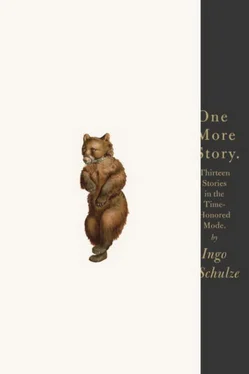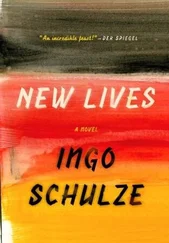I hear myself say Kertész, I hear myself say Konrád and Nadás, when I actually ought to be dropping very different names, but I’m boasting, boasting nonstop, I’m insufferable. I’m digging a hole to jump into.
Katja is paging through the menu, I follow the movements of her eyes. I try to signal the waitress, but she’s busy clearing tables. The mole appears. I point to Katja. She’d like an apple juice, an apple juice and water, no, nothing to eat, really nothing. I order a seafood salad, a white wine, and water. “Effervescent white, perhaps?” the mole asks with a smug Viennese lilt.
“It’s very good,” Katja said. Okay then, for all I care, effervescent white.
Once we’ve ordered we gaze at each other as if everything has already been said and we can leave now. I say that Vienna was suddenly just around the corner.
Yes, Katja says, Budapest is a just stone’s throw away.
The mole arrives. I have to make another selection. This time I order the skewer of prawns for sixteen euros, the most expensive item on the menu.
Katja has now leaned back, one hand on the table. Her fingers move, she’s actually drumming the tabletop. I make some remark, and it feels like I’m squeezing the last glob out of a tube of toothpaste.
Katja splays her fingers and examines her nails. For a moment it seems absurd to be this close to Katja and not be allowed to touch her.
“Are you two married?” I ask.
“For over a year now,” she says. I would love to ask if she already knew him while we were together.
“Excuse me,” she says, gets up and heads for the toilet. Two men observe her rear end. One of them turns around to me, our eyes meet.
Katja and I make small talk. She sips at her apple juice, I drink my effervescent white and say it’s fine, a good recommendation. In Budapest, I say, the exchange rate is now 1 to 250, and can stay that way as far as I’m concerned. I say that in Café Eckermann an espresso — a really very good espresso with milk and mineral water — costs 240 forints.
A half hour later I wave the mole over. “It will be right out,” he says. “Right out.”
“I’m not an impatient guy,” I say, “but I don’t understand why just a skewer …” Except for the two men the restaurant is empty. I finish my effervescent white, reach for my glass of water.
“And?” the traveler asks, laying his left hand on the blue folder. “What are you working on right now?”
“Just translations,” she says.
“And your new volume of poetry, when’s it due out?”
She shrugs.
He sips at his water.
“I’m not writing,” Katja says. “I haven’t written for three years now.” And after a pause: “Maybe I did something wrong, and this is my punishment.” Suddenly Katja looks like she’s about to read one of her poems.
“What are you supposed to have done wrong?” he asks.
“I don’t know,” she says. “Are you afraid I’ll write something about us?”
“To be honest …” Our traveler smiles. Or is it more the face of a whiny little boy? And then it happens, maybe out of embarrassment, maybe out of weakness, maybe because he’s putting all his trust in the power of confession. He admits that he boarded the train because of two stories, because of “Official Report” by Imre Kertész and “Life and Literature” by Péter Esterházy, which both describe a train trip from Budapest to Vienna — that is to say, in the case of Kertész, in the direction of Vienna. He admits that the fruitful idea of traveling two or three hours to Vienna arose out of the hope of assisting his own imagination and providing direction to the unflagging impetus of his creative spirit (motus animi continuus) , of affording it an opportunity to soar in jubilation. Just as Esterházy alludes to Kertész’s story, he wanted to allude to both stories and produce something like a comparative drama of railroad stations. Each sentence of his models seemed to him as significant as an antiphon in a liturgy, so that, or so he believed, he needed only to insert, sentence by sentence, his own observations and memories in order to experience something of the world as it is today, of the changes of the last few years, yes, something about his own generation as well. For Kertész had elevated (or better: bumped up, boosted) the story of his customs experience to an interpretation of life itself. (Please, do take the time to read the reason why a customs agent confiscated his passport on April 16, 1991, ordering him to leave the train at the border station in Hegyeshalom.) He likewise wanted to confront this customs agent, to invoke within himself and as if in a vision — damn literature! — the official report of Imre Kertész. I close my eyes, our traveler wanted to write, and see myself at the end of the world and finally comprehend: It’s this Hegyeshalom! For decades the Hegyeshalom of Imre Kertész, this wretched filthy Podunk, was seen as the symbolic way out— in hoc signo vinces . Hegyeshalom! I can still see him pointing to the crest of Svábhegy from his apartment balcony only yesterday evening. I still see him, he wanted to write, see his big, hunched, heavy figure, the anti — Michael Kolhaas, who does not seek his truth, because his truth has found him. I saw his sentences, each one by itself — big, hunched, heavy sentences — swaying inexorably toward the final naked insight.…
But the customs agents never showed up. Our stop in Hegyeshalom lasted three minutes. The train pulled out, rolled over the border, and he, the free son of a free country, experienced nothing, his soul did not soar in jubilation.
“Did you want to find out,” Katja asks our traveler, “how deep the fear still sits?”
“But without customs agents—”
“You should have taken the train to Prague,” Katja says, “from Dresden to Prague.”
“Maybe,” he says. “But I’m here now.”
“So you didn’t want to see me at all.”
“Sure I did, of course, I wouldn’t have made the trip if it weren’t for you.”
“No,” Katja says, “I was just the pretext.”
He looks at her. He lays his hand on hers. “I’m not sure, Katja — on my honor, I’m genuinely not sure.”
“You’re disappointed — no customs agents, no story.”
“Yes,” he says.
“No customs agent to demand you hand over your story.”
He nods and leans back for the first time. “I even had the title,” he says.
Katja smiles at him.
“‘One More Story,’” he whispers and looks like a little boy again.
“Well then just write a different story, leave out the customs agent.”
With the gesture of a magician forced to take the stage at the most inauspicious moment, I remove the blue folder from the table and let it vanish into my bag.
“Do you have to go?”
“No,” I say, and think: There is love in her. Then I get up and walk over to the counter. I wouldn’t want those prawns now, even if they did show up. Accepting prawns after an hour’s wait would be an act of self-abasement. “I’ll pay for the effervescent white,” I say, “two waters, and an apple juice.” The mole immediately starts punching up the numbers. The waitress calls out, “Cancel the order, the whole thing,” and says that the gentleman — to wit, me — doesn’t need to pay for the drinks and that she’s sorry, very sorry. I ask why even after an hour they were incapable of serving a skewer of prawns.
She says they had searched themselves silly but simply couldn’t find the prawns.
“Maybe you’re sold out,” I say, as if it were in my interest to find a better excuse. “Not only is the seafood sold out, but also the prawns, prawns being after all a form of seafood.”
“Yes,” the waitress says. “That may well be, the gentleman is probably right.”
Читать дальше












